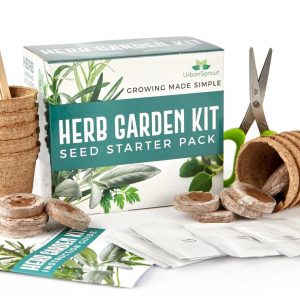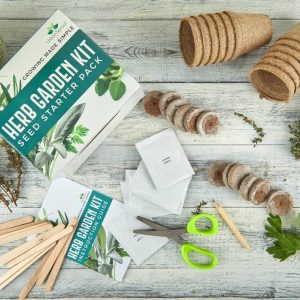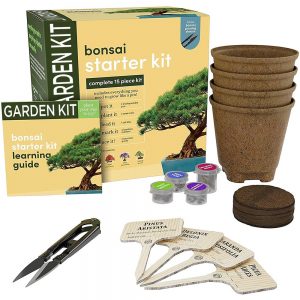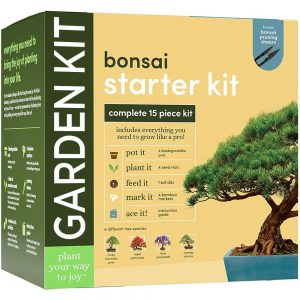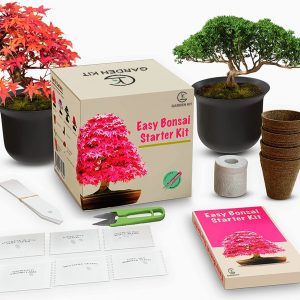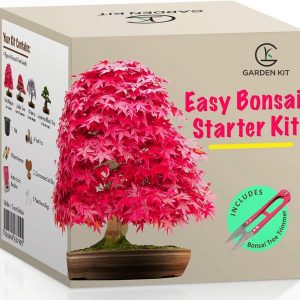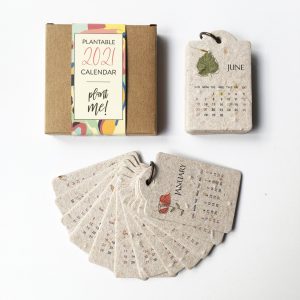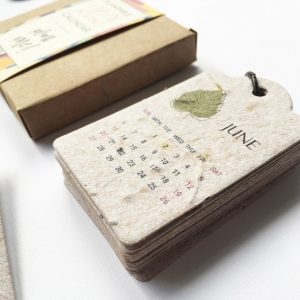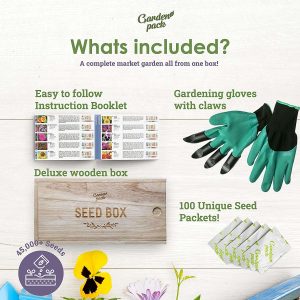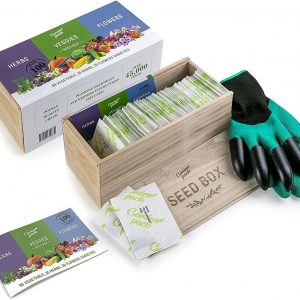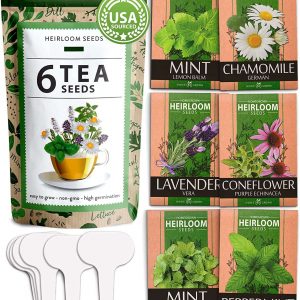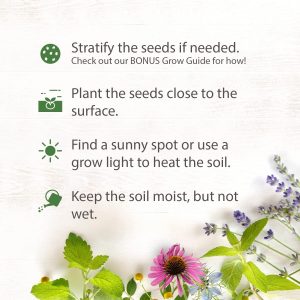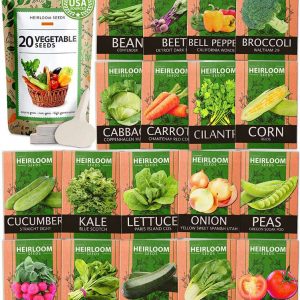Gardening has long been a cherished pastime, connecting individuals with nature’s beauty and the satisfaction of nurturing life. It’s an art form that has been passed down through generations, teaching patience, responsibility, and a profound appreciation for the environment. As we seek ways to engage children in meaningful, hands-on activities that foster creativity and a connection to the natural world, the “Kids Plant and Paint Kit” emerges as a delightful solution.
This article embarks on a garden adventure, exploring the fascinating world of kids plant and paint kits. We’ll dive into the reasons why such kits are becoming increasingly popular, their benefits for children’s development, and how to make the most of this educational and entertaining experience.
The Rise of Kids Plant and Paint Kits
In recent years, there has been a noticeable shift in the way we approach children’s education and leisure activities. While the digital age continues to influence childhood experiences, parents and educators are actively seeking ways to balance screen time with more hands-on, nature-based pursuits.
The rise of kids plant and paint kits can be attributed to several factors:
1. Promoting Environmental Awareness
In an era when environmental concerns are at the forefront of public consciousness, teaching children about the natural world has never been more critical. Kids plant and paint kits provide an ideal platform to introduce kids to the concept of sustainable living, the importance of plants in our ecosystem, and the role they can play in preserving our planet.
2. Encouraging Creativity
Creativity is a vital aspect of child development. Planting and painting combine artistic expression with scientific exploration, allowing children to exercise their imagination while gaining a deeper understanding of plant life cycles, colors, and patterns.
3. Fostering Responsibility
Caring for living organisms instills a sense of responsibility in children. With kids plant and paint kits, youngsters learn about the needs of their chosen plants, including water, sunlight, and soil. This hands-on experience helps develop nurturing skills that can extend beyond the garden.
4. Quality Family Time
In a fast-paced world, finding opportunities for quality family time can be a challenge. Planting and painting together offers a chance for parents and children to bond while sharing an enriching, educational experience.
The Components of a Kids Plant and Paint Kit
A typical kids plant and paint kit usually includes the following components:
1. Seeds or Seedlings
The heart of any gardening adventure is, of course, the plant itself. Kits may contain seeds or young seedlings, depending on the complexity and age group they target. Common choices include flowers, herbs, and vegetables.
2. Potting Soil
High-quality potting soil provides the necessary nutrients and support for the plant’s growth. It’s often included in the kit, ensuring that beginners have everything they need to start their gardening journey.
3. Planting Containers
Containers come in various shapes and sizes, from traditional pots to more creative options like biodegradable plantable pots. These containers not only serve as homes for the plants but also offer a canvas for artistic expression.
4. Paints and Brushes
The paint and paintbrushes are where the “paint” element of the kit comes into play. These tools allow children to decorate their plant containers, adding a personalized touch to their garden.
5. Instructional Materials
Clear, step-by-step instructions or a guidebook accompany most kits. These materials are designed to be accessible to children, ensuring that they can follow the planting and painting process independently or with minimal adult assistance.
6. Labels and Markers
Labeling the plants is both practical and fun. Kits often include markers and labels so children can name their plants and track their progress.
7. Educational Extras
Some kits go the extra mile by including educational materials such as plant care tips, fun facts about the chosen plant species, or information about pollinators and the importance of bees and butterflies in gardens.

The Benefits of Kids Plant and Paint Kit
Now that we’ve explored what’s inside a kids plant and paint kit, let’s delve into the numerous advantages this hands-on activity offers for children:
1. Hands-On Learning
Planting and painting engage multiple senses and types of intelligence, making it a well-rounded learning experience. Children see, touch, smell, and even taste the plants they grow, providing a holistic understanding of the natural world.
2. Patience and Responsibility
Gardening requires patience as children wait for their plants to grow and flourish. This teaches them to be patient and responsible caretakers, skills that can be applied to various aspects of life.
3. Connection to Nature
In an increasingly urbanized world, kids plant and paint kits offer a bridge to nature. Children can witness the magic of growth and discover the wonders of the outdoors from the comfort of their own homes.
4. Artistic Expression
Painting the plant containers allows children to express themselves artistically. Whether they create vibrant patterns, abstract designs, or thematic decorations, it’s an opportunity for self-expression and creativity.
5. Scientific Curiosity
Gardening naturally sparks curiosity about biology and ecology. Kids may ask questions about the plant’s needs, the insects they encounter, and the changes they observe, fostering a lifelong interest in science.
6. Pride and Ownership
Watching a plant thrive under their care instills a sense of pride and ownership in children. It’s a tangible accomplishment that boosts their self-esteem.
How to Make the Most of a Kids Plant and Paint Kit
To ensure that your child has a memorable and enriching garden adventure, consider the following tips:
1. Choose the Right Kit
Select a kit that aligns with your child’s age, interests, and skill level. Some kits are designed specifically for younger children, while others are more advanced and suitable for older kids.
2. Create a Learning Environment
Take the opportunity to discuss the plant’s growth process and the science behind it. Encourage your child to ask questions, observe changes, and keep a gardening journal.
3. Personalize the Experience
Let your child’s imagination run wild when decorating the plant containers. Offer guidance but allow them to take the lead in expressing their creativity.
4. Foster Independence
Depending on your child’s age, encourage them to take charge of watering, monitoring sunlight, and overall plant care. This independence cultivates a sense of responsibility.
5. Embrace the Journey
Gardening can be unpredictable, with plants sometimes facing challenges like pests or unfavorable weather. Use these moments as opportunities to teach resilience and problem-solving.
6. Celebrate Achievements
Celebrate milestones in the plant’s growth, from the first sprout to the first flower or fruit. Acknowledge your child’s efforts and the beauty they’ve brought into the world.
Conclusion: A Blooming Future
As we navigate an ever-changing world, it’s crucial to provide our children with opportunities to connect with nature and develop essential life skills. Kids plant and paint kits offer a captivating, educational, and environmentally conscious way to achieve these goals. They empower children to become caretakers of the earth while fostering creativity, responsibility, and a lifelong love for gardening.
So, why wait? Embark on a garden adventure with your child today. Plant those seeds, paint those pots, and watch as a world of colorful, living wonders unfolds before your eyes. In the process, you’ll witness your child’s growth, not just as a gardener but as a curious, creative, and responsible individual.
Related Products

